Ep. 80: Dr. Lawrence Haddad, Executive Director of Global Alliance for Improved Nutrition (GAIN) – Geneva Switzerland ||
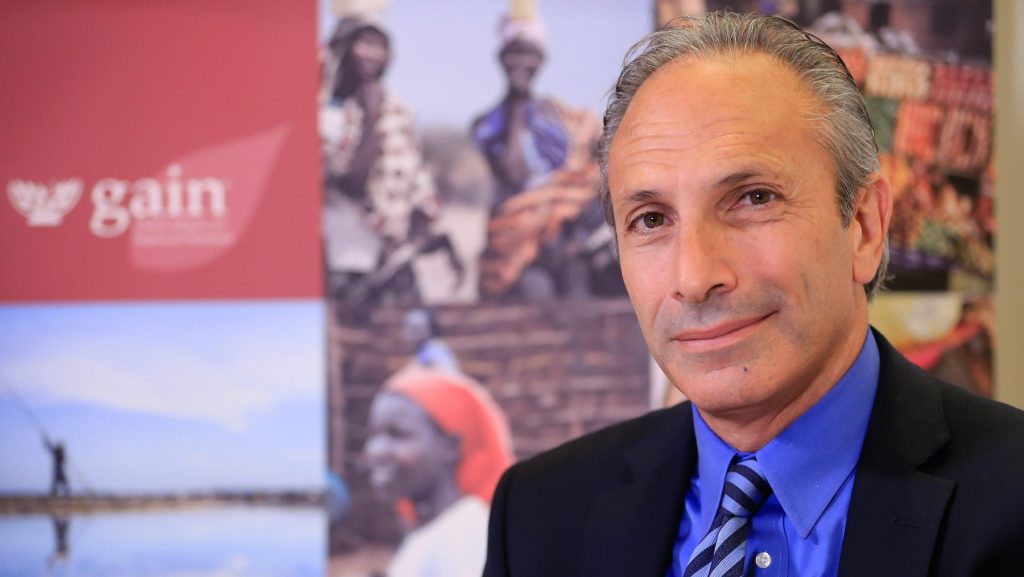 .
.
For Sourcing Matters episode 80 we welcome Dr. Lawrence Haddad – Executive Director of the Global Alliance for Improved Nutrition (GAIN). The Global Alliance for Improved Nutrition (GAIN) was launched at the UN in 2002 to tackle the human suffering caused by malnutrition. Working with diverse global partners, GAIN aims at making healthier food choices more affordable, more available, and more desirable.
.
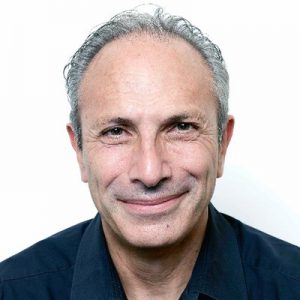 Dr. Lawrence Haddad became the Executive Director of GAIN in October 2016. Prior to this Lawrence was the founding co-chair and lead author of the Global Nutrition Report from 2014 to 2016. From 2004-2014 Lawrence was the Director of the Institute of Development Studies (IDS), the world’s leading development studies institute. Before joining IDS in 2004, he was Director of the Food Consumption and Nutrition Division at the International Food Policy Research Institute (IFPRI) from 1994 to 2004. An economist, Lawrence has a PhD in Food Research from Stanford University. Most recently, in June of 2018 – the World Food Prize Foundation awarded Dr. Haddad the 2018 World Food Prize.
Dr. Lawrence Haddad became the Executive Director of GAIN in October 2016. Prior to this Lawrence was the founding co-chair and lead author of the Global Nutrition Report from 2014 to 2016. From 2004-2014 Lawrence was the Director of the Institute of Development Studies (IDS), the world’s leading development studies institute. Before joining IDS in 2004, he was Director of the Food Consumption and Nutrition Division at the International Food Policy Research Institute (IFPRI) from 1994 to 2004. An economist, Lawrence has a PhD in Food Research from Stanford University. Most recently, in June of 2018 – the World Food Prize Foundation awarded Dr. Haddad the 2018 World Food Prize.
.
THE FACTS: According to Global Nutrition Report, about 88% of countries suffer from two or three forms of malnutrition. Every day, 815 million people are going to bed hungry, up from 777mm in 2015. 1 in 3 people lack key micronutrients, like iron and vitamin A, needed to grow properly, live active lives, and raise a healthy family. At the same time, 2 billion adults are overweight or obese and 41 million children are overweight. Malnutrition now undermines billions of people’s health and leaves 155mm children stunted every year. In speaking to the outcomes that come to stunted children “without proper nutrition – children’s hardware and software is not developing properly” – explains Haddad.
.
GAIN has its sights set on addressing these far reaching concerns with both an air and ground attack. Led by Haddad and his impressive teams across the world – GAIN uses boots on the ground and strategic influence to introduce nutrition as a framework of change to more. TuneIn to our 50 minute conversation to hear about how this agent of change is tackling malnutrition throughout global societies being underfed, and overfed.
.


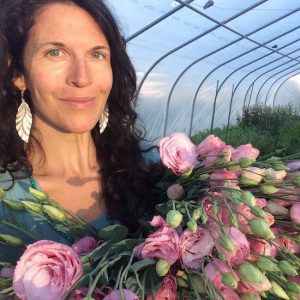 Stone Barns Center for Food and Agriculture was developed by David Rockefeller and dedicated to the memory of his wife, Peggy Rockefeller. The Stone Barns Center’s mission is to demonstrate, teach and promote sustainable, community-based food production. Open to visitors of all ages but with an emphasis on K-12 education, the Center offers a unique experience: a chance to learn about farming firsthand on a real working farm within a 30-minute drive of New York City. Livestock, chickens, vegetables, gardens, greenhouses a learning facility and cultural center demonstrate to the public the advantages of local, community-based farming and environmentally sensitive agricultural practices. The Center is also home to Blue Hill at Stone Barns, a four star restaurant that offers guests a taste of the farm and of the Hudson Valley.
Stone Barns Center for Food and Agriculture was developed by David Rockefeller and dedicated to the memory of his wife, Peggy Rockefeller. The Stone Barns Center’s mission is to demonstrate, teach and promote sustainable, community-based food production. Open to visitors of all ages but with an emphasis on K-12 education, the Center offers a unique experience: a chance to learn about farming firsthand on a real working farm within a 30-minute drive of New York City. Livestock, chickens, vegetables, gardens, greenhouses a learning facility and cultural center demonstrate to the public the advantages of local, community-based farming and environmentally sensitive agricultural practices. The Center is also home to Blue Hill at Stone Barns, a four star restaurant that offers guests a taste of the farm and of the Hudson Valley.
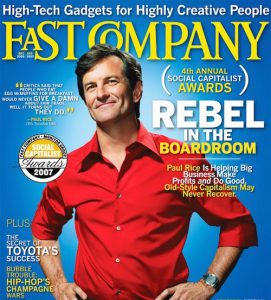 Twenty years later, Fair Trade has grown into a widely-known and increasingly mainstream consumer trend that is rapidly approaching an inflection point. In 2016, consumer recognition of the Fair Trade Certified label reached 67% and U.S. retail sales of Fair Trade products grew to an estimated $6 billion. Paul and his team have enlisted the support of over 1,300 companies, including market leaders like Green Mountain, Starbucks, Nespresso, General Mills, PepsiCo, Whole Foods, Costco, Target and Walmart. Fair Trade USA now certifies coffee, tea, cocoa, sugar, coconut, fresh fruits and vegetables. Most recently, through groundbreaking partnerships with Patagonia, West Elm and Gap Inc., Fair Trade has begun certifying apparel and home furnishings to improve working conditions and incomes for factory workers.
Twenty years later, Fair Trade has grown into a widely-known and increasingly mainstream consumer trend that is rapidly approaching an inflection point. In 2016, consumer recognition of the Fair Trade Certified label reached 67% and U.S. retail sales of Fair Trade products grew to an estimated $6 billion. Paul and his team have enlisted the support of over 1,300 companies, including market leaders like Green Mountain, Starbucks, Nespresso, General Mills, PepsiCo, Whole Foods, Costco, Target and Walmart. Fair Trade USA now certifies coffee, tea, cocoa, sugar, coconut, fresh fruits and vegetables. Most recently, through groundbreaking partnerships with Patagonia, West Elm and Gap Inc., Fair Trade has begun certifying apparel and home furnishings to improve working conditions and incomes for factory workers.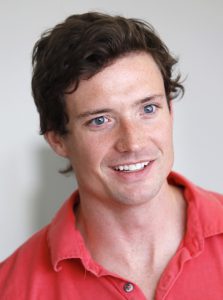 BIO: Luke Holden grew up in Cape Elizabeth, Maine – a third-generation lobsterman who started learning the trade at age 13. After attending Georgetown University and beginning an investment banking career on Wall Street, Luke was remiss to find that every lobster roll available in New York was overpriced, drowning in mayo, and diluted with celery. He craved a real Maine-style roll and simply couldn’t find one.
BIO: Luke Holden grew up in Cape Elizabeth, Maine – a third-generation lobsterman who started learning the trade at age 13. After attending Georgetown University and beginning an investment banking career on Wall Street, Luke was remiss to find that every lobster roll available in New York was overpriced, drowning in mayo, and diluted with celery. He craved a real Maine-style roll and simply couldn’t find one.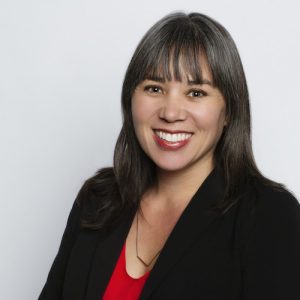 BIO: Before joining the foundation, Teresa Ish was the seafood project manager for the Corporate Partnerships Program at Environmental Defense Fund, where she worked with leading seafood buyers to develop and implement sustainable seafood purchasing policies. During her tenure at EDF, she played an instrumental role in merging the organization’s seafood buyer work and its extensive experience in the fishery policy arena. Prior to joining EDF, she co- founded FishWise and served as its director of science.
BIO: Before joining the foundation, Teresa Ish was the seafood project manager for the Corporate Partnerships Program at Environmental Defense Fund, where she worked with leading seafood buyers to develop and implement sustainable seafood purchasing policies. During her tenure at EDF, she played an instrumental role in merging the organization’s seafood buyer work and its extensive experience in the fishery policy arena. Prior to joining EDF, she co- founded FishWise and served as its director of science. With three consecutive James Beard nods, Kris Komori is the rock star of Idaho’s chef world. A graduate of the College of Idaho, he sharpened his kitchen skills in Portland before moving to the Gem State. Komori’s creative, constantly changing menus drew fast admiration when State & Lemp opened in 2013. Most recently, he and his team have been developing a new concept and restaurant that will launch in downtown Boise soon.
With three consecutive James Beard nods, Kris Komori is the rock star of Idaho’s chef world. A graduate of the College of Idaho, he sharpened his kitchen skills in Portland before moving to the Gem State. Komori’s creative, constantly changing menus drew fast admiration when State & Lemp opened in 2013. Most recently, he and his team have been developing a new concept and restaurant that will launch in downtown Boise soon.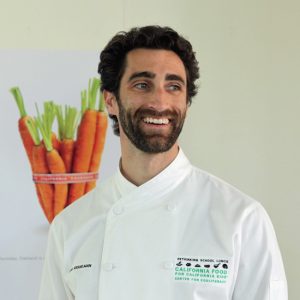 Kesselman’s programs encourage schools to teach and model education for sustainable living – beginning with a good diet. The students that Adam and Vince work with have an opportunity to experience and understand how nature sustains life and how to live accordingly. One such program – California Thursdays – now servers over 334 million school meals a year, which accounts for 33% of the school meals in California. Every meal serves California-grown, for California kids – and of which has focus on food quality and integrity from the source. Economists estimate that every dollar spent on local food can generate up to an additional $1.40 in spending, supporting local economies. So, built upon that – what’s it worth to any of us to provide our kids and our neighbor’s kids preventative healthcare and good consumption habits – things that tend to carry-on for a lifetime.
Kesselman’s programs encourage schools to teach and model education for sustainable living – beginning with a good diet. The students that Adam and Vince work with have an opportunity to experience and understand how nature sustains life and how to live accordingly. One such program – California Thursdays – now servers over 334 million school meals a year, which accounts for 33% of the school meals in California. Every meal serves California-grown, for California kids – and of which has focus on food quality and integrity from the source. Economists estimate that every dollar spent on local food can generate up to an additional $1.40 in spending, supporting local economies. So, built upon that – what’s it worth to any of us to provide our kids and our neighbor’s kids preventative healthcare and good consumption habits – things that tend to carry-on for a lifetime.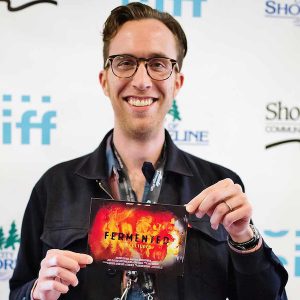 From episodes of Anthony Bourdain’s “Parts Unknown” and the PBS & Netflix program – “Mind of a Chef” – Cianfrani has been worked as a producer, director and editor for New York City – based – Zero-Point-Zero (ZPZ) production. Most recently, Jon directed the feature documentary titled “Fermented” which is scheduled to air online in April 2019. Hosted by Chef Edward Lee, the film poses the question: “What is Fermentation?” to chefs and artisans on the west coast, Chicago, and rural Japan.
From episodes of Anthony Bourdain’s “Parts Unknown” and the PBS & Netflix program – “Mind of a Chef” – Cianfrani has been worked as a producer, director and editor for New York City – based – Zero-Point-Zero (ZPZ) production. Most recently, Jon directed the feature documentary titled “Fermented” which is scheduled to air online in April 2019. Hosted by Chef Edward Lee, the film poses the question: “What is Fermentation?” to chefs and artisans on the west coast, Chicago, and rural Japan.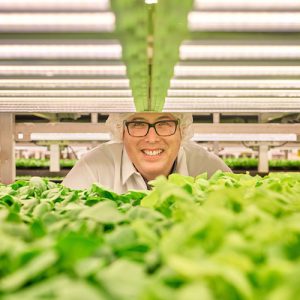 AeroFarms is a leading clean-technology champion, building and operating state-of-the art indoor vertical farms in major cities around the world. Helping set new culinary standards for freshness and flavor, AeroFarms has been recognized as a Global Cleantech 100, Inc.com’s Top 25 Disruptive Companies, Winner of the World Technology Award for Most Impactful Environmental Company, and Finalist for The Circular Awards of The World Economic Forum.
AeroFarms is a leading clean-technology champion, building and operating state-of-the art indoor vertical farms in major cities around the world. Helping set new culinary standards for freshness and flavor, AeroFarms has been recognized as a Global Cleantech 100, Inc.com’s Top 25 Disruptive Companies, Winner of the World Technology Award for Most Impactful Environmental Company, and Finalist for The Circular Awards of The World Economic Forum.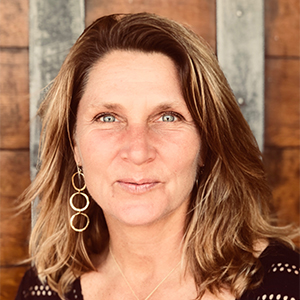 The goal of regenerative organic agriculture is to offer practical solutions to the world’s biggest social and ecological challenges. We’ve learned that we’re beyond the point of sustainability and we need to regenerate the soil and land that supports us, the animals that nourish us, and the farmers and workers that feed us. This has developed into a call to action of the ROA and defined a path forward where we’re all part of the solution.
The goal of regenerative organic agriculture is to offer practical solutions to the world’s biggest social and ecological challenges. We’ve learned that we’re beyond the point of sustainability and we need to regenerate the soil and land that supports us, the animals that nourish us, and the farmers and workers that feed us. This has developed into a call to action of the ROA and defined a path forward where we’re all part of the solution.